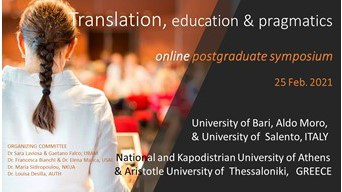Description
Advertising literacy in relation to masculine genericness in the translation of advertisements
Stavroula Vergopoulou
ARISTOTLE UNIVERSITY OF THESSALONIKI
Within the context of translation, education, and pragmatics, this study focuses on the generic use of masculine terms in the translation of advertisements between Greek, English, and German as well as the importance of advertising literacy as an educative tool. A thought-provoking example of (false) generics in Greek is the lexeme ‘άνθρωπος’ [ánθropos] (‘human being’/‘person’). Although it is morphologically marked for gender by the -ος [-ós] suffix, which typically signifies the masculine grammatical gender, it is semantically gender-neutral, by definition addressing or referring to both men and women. Nonetheless, despite its theoretical semantic gender neutrality, ‘άνθρωπος’ is most often used in practice to address or refer to men—in this way, it is pragmatically marked for gender. The generic use of masculine terms is typical of synthetic inflecting languages like Greek and German, in which inflection indicates differences in gender. In Greek, this generic use is very often explained by equating ‘άνθρωποι’ [ánθropi] (‘persons’) with any masculine term, such as, ‘δάσκαλοι’ [δáskali] (‘(male) teachers’). However, genericness
expressed through masculine terms arguably does not include or fully represent all people—primarily women, but also non-binary individuals. Therefore, one could say that the generic use of masculine terms is vague and even potentially misleading or pseudogeneric, as it excludes women from fair representation. This issue of inclusion/exclusion could be seen as interconnected with the nature of a language, whether synthetic or analytic. In the analytic English language, in contrast to Greek and German, grammatical gender plays a much smaller role. Thus, translation between these languages may increase or decrease the generic use of masculine terms and, in turn, linguistic sexism. Looking at the translation of advertising texts in particular, how can advertising literacy educate us about linguistic sexism in this translation process?

